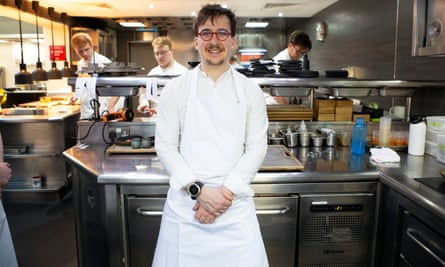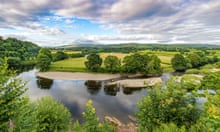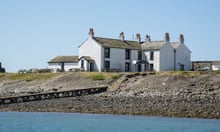When Simon Rogan and his family moved to Cumbria in 2002, the Lake District was famed for many reasons but food was not top of the menu. Visitors came in droves for the hills, rather than the haute cuisine.
Twenty years later their feted village restaurant, L’Enclume, is at the centre of a “mind-blowing” culinary renaissance that has led some diners to compare Cumbria to international foodie havens such as Paris, San Sebastián and Copenhagen.
The comparisons are not so outlandish: Cumbria now has more Michelin stars than any other UK county, and L’Enclume this week became the first restaurant outside London or Berkshire to win the coveted three stars. Not bad for the land of mint cake and spicy sausage.
“This is a cluster in a world-class landscape. It is not just nationally significant but it’s globally significant,” said Thom Hetherington, an industry judge and chief executive of the Northern Restaurant and Bar show in Manchester.
L’Enclume, housed in a 13th-century former blacksmith’s in the ancient village of Cartmel, on the southern tip of the Lake District, focuses on seasonal “farm-to-fork” dining, using only produce from Rogan’s nearby 4.8-hectare (12-acre) farm and other local providers.
A day after its third Michelin star was announced, the champagne corks have been cleared away and quiet chatter fills the small dining room of oak beams and low ceilings. Guests wait months for a seat in Rogan’s restaurant, where a 10-course lunch menu costs £100. By this weekend, L’Enclume is expected to be fully booked until 2023.

“We’re not the only ones who are fully booked – all the restaurants are in the Lake District,” said Rogan, adding that the local hospitality industry had “exploded” since restaurants reopened after the pandemic.
This is partly explained, he said, by the region shrugging off hackneyed stereotypes about northern cuisine – bread and dripping, chips and gravy – and becoming a gastronomic counterweight to London.
A new breed of visitor has discovered, or rediscovered, the Lakes during lockdown: the young, free-spending millennial. This younger generation of diner has helped shift a “lazy” perception of the north and its grub: “There has been this ‘grim up north, nothing really happens up there’ attitude but Covid has smashed that out of the park,” Rogan said.
Cumbria now has one star for every 48,000 people, compared with one for every 98,000 in London. The Dog and Gun inn, a family-run gastropub in the village of Skelton, near Penrith, was the latest to be added to the list this week.
Hetherington, a judge in the annual National Restaurant Awards, said the density of world-class restaurants in Cumbria was “mind-blowing” and that northern England was now “starting to punch above its weight” as a culinary destination. “You look at affluent, international, serious foodies travelling all over the world and they want to go to Tokyo or Paris and San Sebastián or Copenhagen. For me, the Lake District is absolutely at that level,” he said.

“If you went back 20, 25 years there was certainly some truth in the idea that the food scene in the north of England was significantly lagging behind London,” he added. “I think that has not only levelled up, but it’s almost tipped in the north’s favour now.”
Last year’s National Restaurant Awards said four out of five of the UK’s best restaurants were in northern England, while four of the top five gastropubs were in Yorkshire and Lancashire.
Rogan, who now has five Michelin stars to his name, ascribes the north’s success in part to the ever-growing British appetite for sustainable, locally sourced produce and increasingly “savvy” local farmers, whom he says have “really upped their game” in recent years.
Top chefs are also drawn to the region in search of a better quality of life and more affordable property. Two of Rogan’s proteges, Tom Barnes and Paul Burgalières, were lured to work in sleepy Cartmel (population: 4,000) from one of the world’s stellar restaurants, Geranium in Copenhagen.
Rogan, who joins the UK’s small pantheon of three-star chefs, who include his former mentor Marco Pierre White, said the accolade was “a dream come true” – but that he was “gutted” his Windermere restaurant, Henrock, had missed out.
He is confident, however, that more awards will follow. “There’s other places knocking on the door and sleeping giants that are waking up,” he said. “Every chef or operator wants a piece of it and it’s attracting incredible talent to the county now. I do see a lot more Michelin stars.”








